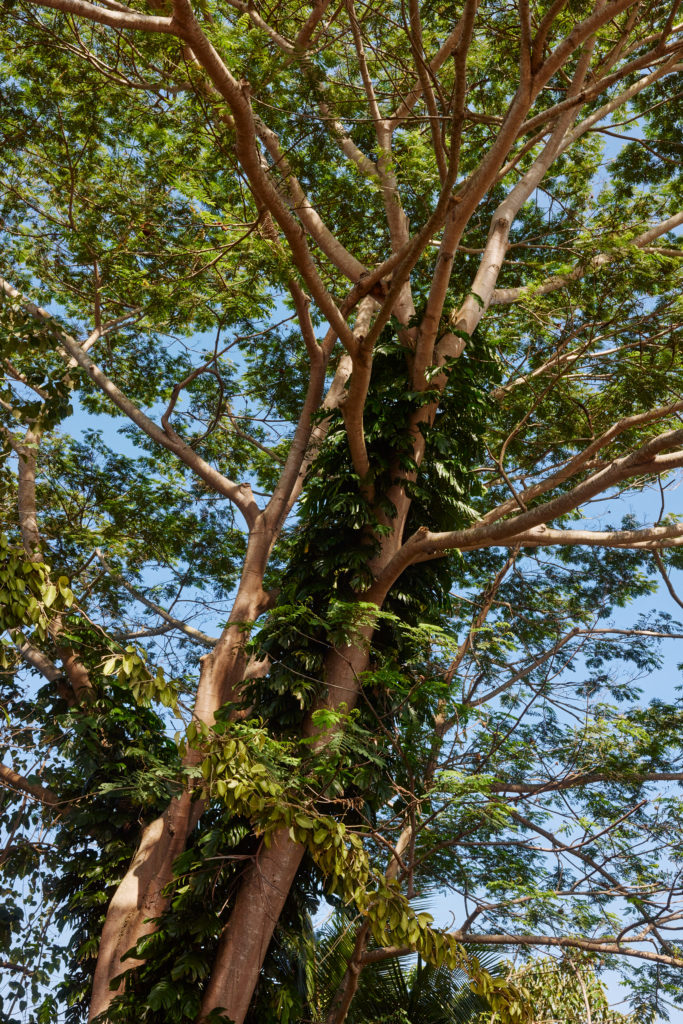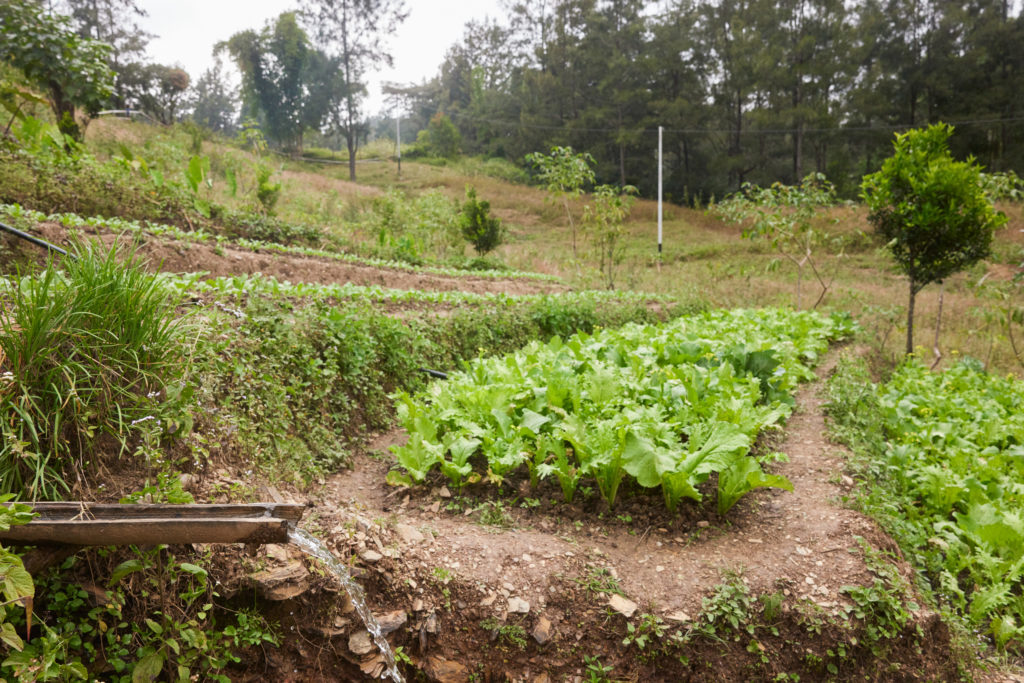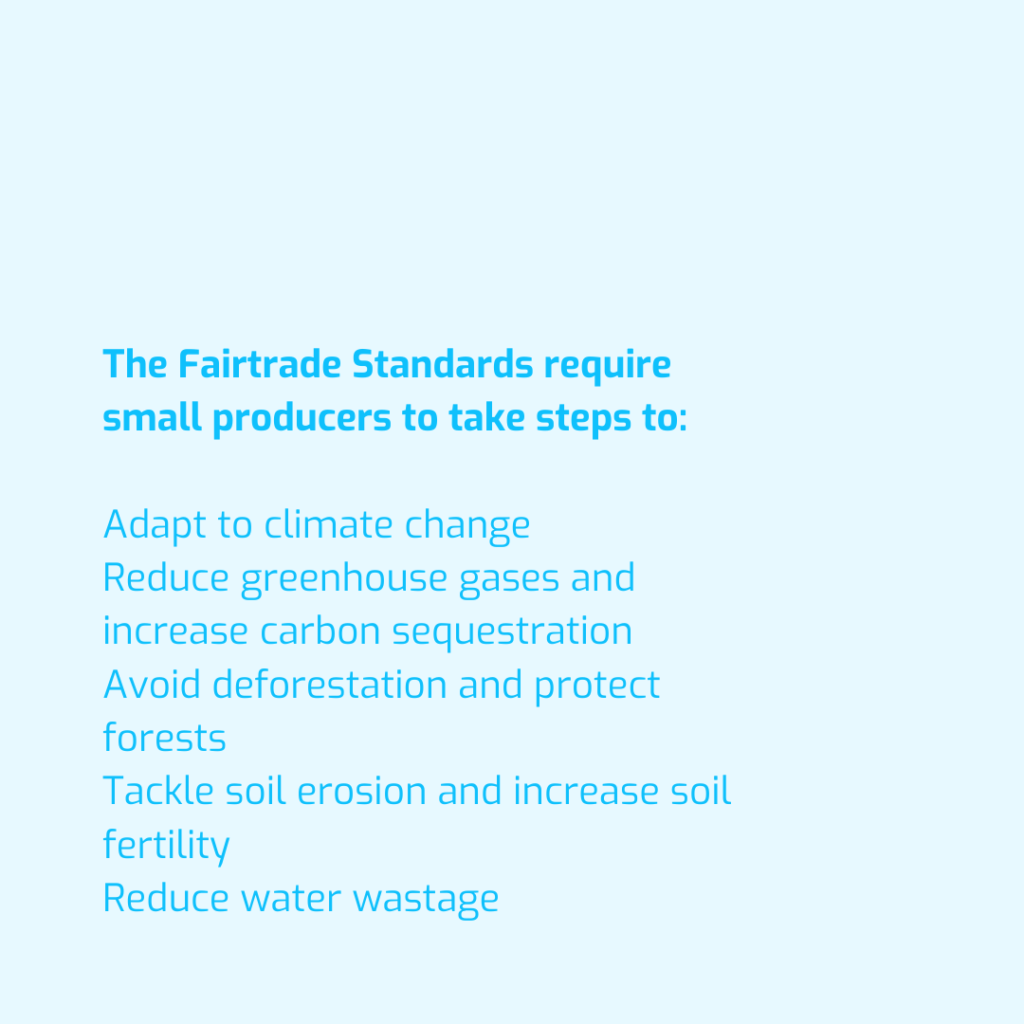Farmers are on the front line of climate change. For millions of farming families and communities worldwide, especially those in the global south, the impacts of climate change are a daily reality. So how is Fairtrade involved? Our Climate FAQs break it down.
—
Why are you campaigning on the climate?
The climate crisis is the biggest threat to the livelihoods of millions of small-scale farmers and agricultural workers in low-income countries worldwide. Millions of farming families and their communities stand on the front line of a climate crisis they have done the least to cause. As extreme weather events become increasingly frequent, fertile soil is lost and crop diseases spread, these communities also face rising debts from Covid-19 on top of loss and damage from climate change.
These debts, alongside already low incomes, mean these communities are unable to invest in ways to adapt to a changing climate, let alone clean energy, and climate-smart farming methods needed to protect the planet’s forests and help restore biodiversity.
We all rely on farmers to produce the food we need for a growing global population. Eighty percent of the world’s food comes from 500 million family farms. These farmers have years of experience stewarding the land they live on; farming communities in climate-vulnerable countries already have the knowledge to create solutions and to protect the ecosystems everybody relies on. What they don’t have is the financial support to make those changes happen.
Until farmers earn more for their crops, they continue to struggle to cover just their basic human rights; a nutritious diet, children’s education and healthcare, let alone face the challenges of the climate crisis. Farmers in climate vulnerable countries need empowerment, fair value, fair prices, and fairer trading practices to resource the investment needed for mitigation, adaptation, diversification and resilience in the face of the climate emergency.
Wealthy nations have done the most to create the climate crisis. For generations, the exploitation of people and planet has caused extreme global inequality and a climate emergency. Wealthy nations must deliver on their promise to invest in tackling climate change right now. The long-promised financial support to adapt needs to reach those who contributed the least to the climate crisis and fast.
Political leaders at COP26, a critical global summit in the fight against climate change, were confronted with this reality, yet despite some new pledges to curb emissions, which revise projected temperature rises from 3.0 to 2.4 degrees, they were unable to commit to realistic targets to keep them to 1.5 degrees. Commitments to compensate impacted communities for loss and damage due to extreme weather were also notable in their absence from the final agreement.
Ahead of COP27, we must build pressure on governments to keep 1.5 alive. By doing so, we stand in solidarity with people in climate vulnerable nations who will be most impacted by temperature rises. We can’t rely on global summits and governments to take action fast enough to solve the climate crisis. It’s up to all of us – citizens, farmers, workers, businesses, and civil society organisations to come together to play our part in cutting emissions and build pressure for climate promises to be delivered at COP27 next year.

To what extent are farmers and workers affected by climate change?
Fairtrade farmers and workers are bearing the brunt of the climate crisis in the most climate vulnerable nations and it is an immediate and ever-increasing threat to their livelihoods. The number of climate-related disasters has tripled in the last 30 years. At 1.1 degrees, current levels of global heating are causing communities to suffer hurricanes in Central America, floods and landslides in India, sweeping away people’s homes, destroying entire livelihoods in seconds, while swarms of locusts affect East Africa and extreme drought continues in Southern Africa.
Farmers battle to reduce risks of crop failure and sustain or improve the productivity of their crops. Key challenges are changing rainfall patterns, temperature increase and sea-level rise. Farmers face more and prolonged droughts, irregular and more concentrated precipitation, resulting in changing patterns in growing season. This leads to crop failures or yield declines. Rising temperatures also result in more weeds and pests, for example in coffee, leading to a decline in crop yield and quality. This is particularly important, as cooperatives need to sell to the low-price conventional market if quality is too low.
The future also looks bleak:
- 25% of current coffee farms in Brazil and 37% in Indonesia are likely to be lost to climate change if no action is taken.
- 50% of the land currently used for coffee production will be lost by 2050.
- Many current cocoa growing regions in Ghana and Cote d’Ivoire will become too hot to grow cocoa by 2050.
Is climate crisis really farmers’ number one challenge?
Fairtrade farmers see three main issues as their greatest challenges: limited markets, changing climate/weather and low prices. But the pattern of top challenges varies by region and by the type of product.
For example, for coffee farmers, climate change is right at the top of concerns.
“There is a chain on earth that starts where the producers are. They are the ones who suffer the consequences of climate change, the ones who get the least help, and carry all of the burden. It’s not fair,” said Bayardo Betanco, of the Prodecoop coffee co-operative in Nicaragua.
Despite contributing the least to the climate crisis, smallholders in developing countries are disproportionately affected and have fewer resources to adapt to changes in climate and other stresses. Climate justice can’t happen within a context of poverty, where farmers are too poor to focus on more than their next meal and being able to afford to send their children to school; you can’t tackle the effects of climate change if you are unable to afford to feed your family.
Sustainable livelihoods are the only way that farmers will be able to invest in the changes needed to respond to the devastating impacts of our warming planet. If we want the future of our food to be secure, farmers need financial support to adapt to the climate emergency. Urgent action on climate is a matter of justice, and a matter of science. Climate finance and compensation for loss and damage must reach the communities most impacted by climate change, who also hold solutions to farm us away from climate catastrophe.
Does Fairtrade support farmers to reduce their carbon footprint?
Training on and implementing good farming practices (which is part of Fairtrade Standards) also leads to a reduction of CO2 emissions. Proper use of fertilizers leads to less nitrous oxide emissions. Avoiding destruction of conservation value areas, restoring buffers, and introducing ground covers all contribute to capture carbon in the ground and prevent it being released into the atmosphere. But tackling long term climate change means helping farmers and workers with the cost of switching to low-carbon production and transport.
We cannot expect – and it is not fair to expect – farmers to absorb the costs of more sustainable methods of farming when they’re often not even able to earn a living income or living wage, because the price they receive for their produce is far too low. Poverty – caused in part by decades of chronic underpayment – is a root cause of inability to adapt and mitigate to climate change. Poverty prevents smallholder farmers from developing their businesses: this fuels a vicious cycle of low productivity and declining incomes. The less farmers earn, the harder it is to secure good harvests. All this leaves them financially unable to face up to the challenges of climate change. While the money paid to farmers remains low, they will continue to struggle to cover just their basic human rights; a nutritious diet, their children’s education and family healthcare, let alone find extra funds to pursue climate friendly farming, or to protect themselves and their harvests from extreme weather.
Choosing Fairtrade is an important and immediate way for consumers to show their solidarity with farmers affected by climate change, and governments can do much more to incentivise businesses to support them with finance, fair prices and other assistance to adapt.

If the market is challenging for certain commodities due to climate change, why don’t farmers grow something else?
For the same reasons many Australian dairy farmers still keep cows, when the price of milk is so low, even to the point of not covering production costs. Simple economics suggests when the price falls people leave farming to do something more profitable, but this relies on an assumption of ‘freedom of entry and exit to the market’ – that anyone can simply stop one job and move to another and ‘perfect information’ – that all actors in the supply chain have access to information about pricing and production to be able to predict what will happen. In many supply chains, these are far from the case in reality.
Firstly, there are very few other employment opportunities in rural areas – where most of the world’s coffee, cocoa and bananas are grown. It’s simply not possible for farmers to stop growing a particular commodity. Partly because most of them live under the poverty line and have no access to capital to invest. Partly because a generation of low and declining market prices have left them unable to invest in education, or building up vibrant and resilient local economies.
Secondly, in the case of cocoa, cocoa trees take 3-5 years to reach maturity, and live for 30 years or more. Which means a farmer’s investment in establishing a farm is realised over many years. It’s a very difficult decision to stop doing what you have done for years, possibly what your parents did too, when you have no other savings and can’t capitalise the only asset you do have – cocoa trees on a small plot of land. – Finally, earning income from other sources has to be a major part of the solution. Fairtrade Premium is used by cooperatives to invest in diversifying incomes, making them less susceptible to economic shocks from the main product they grow.
That is why this Fairtrade Fortnight we call on more people to buy more Fairtrade products, enter our competitions, subscribe to our newsletter and take the actions they can. Fairtrade Fortnight 2022 is an opportunity for all of us all to join together to support farmers in the fight against the climate crisis.
What do the Fairtrade Standards say about the environment?
Fairtrade standards are specifically designed to protect the natural and human environment against exploitation. Fairtrade organizations must follow strict rules on pesticides, water conservation, soil erosion, Genetically Modified Organisms (GMOs), diversity, energy use and reducing their carbon footprint. Through the benefits received by selling on Fairtrade terms, farmers are encouraged to work on development requirements of their choice which lead to greater sustainability. Farmer organisations also have the opportunity to report on the activities they are already doing to protect the environment.

How does Fairtrade support farmers in dealing with the effects of climate change?
Fairtrade provides unique benefits, such as the Fairtrade Minimum Price and Premium. Our standards foster organisational development, environmental and financial sustainability, and greater autonomy: providing a strong foundation for farmers to begin implementing climate change adaptation measures. But we also recognise that farmers need additional support and funding to effectively deal with the multi-faceted effects of climate change. for climate change adaptation projects, climate change mitigation, and farmer-driven advocacy. Our overall aim is to enable vulnerable farmers to adapt to climate change and support them to mitigate the impacts, while promoting further sustainable development practices.
After more than 25 years, with all these other schemes and businesses taking action – are you still needed? To say the last two years have been challenging is an understatement. The Covid-19 pandemic’s devastating impact on health, employment, education and the economy has been widely documented and debated since the coronavirus outbreak began in 2020. What has received much less attention, however, has been the widespread disruption the pandemic has played on the international supply chains that we depend on for putting food on our tables. Throughout the crisis, Fairtrade has continued to highlight the harmful consequences of Covid-19 on the farmers and workers in developing countries who are behind many of Australia and New Zealand’s favourite products, including coffee, cocoa and cotton. In March 2020, Fairtrade acted quickly to ensure farmer organisations are able to respond to the needs of their members. Specifically, Fairtrade’s multi-stakeholder Standards Committee changed the rules around the use of the Fairtrade Premium to introduce more flexibility. The Premium is an extra sum of money on top of the selling price that farmer organisations earn on every Fairtrade sale and invest in projects of their choice to benefit their businesses and communities. In addition, Fairtrade Premium Committees on the farms have been able to spend the Premium much more quickly than usual. In normal times, the committees on the farms first submit a formal request to the Standards Committee. Removing this step has allowed the Fairtrade Premium Committees to respond to the crisis with greater urgency. This has compared favourably against other external funds by donors or other actors, some of which took months to reach the front line

